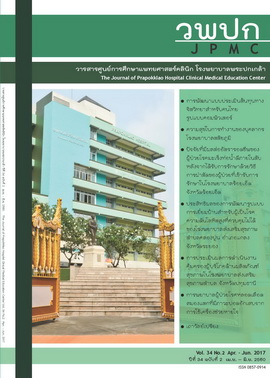ความสุขในการทำงานของบุคลากรโรงพยาบาลตติยภูมิ
Main Article Content
Abstract
บทคัดย่อ
ที่มาของปัญหา : ที่มาของปัญหา: ความสุขในการทำงานเป็นปัจจัยสำคัญที่ส่งเสริมให้บุคคลมีแรงจูงใจที่จะทำงานอย่างเต็มความสามารถ ซึ่งมีผลต่อความก้าวหน้าขององค์กร
วัตถุประสงค์: เพื่อศึกษาปัจจัยที่มีผลต่อความสุขในการทำงานของบุคลากรโรงพยาบาลตติยภูมิแห่งหนึ่ง และระดับความสุขในการทำงาน
วัสดุและวิธีการ : ศึกษาในบุคลากรของโรงพยาบาลตติยภูมิจำนวน 311 คน เครื่องมือที่ใช้ในการวิจัย พัฒนามาจากปัจจัย 11 ด้านที่เกี่ยวกับความสุขในการทำงานตามทฤษฎีสององค์ประกอบของ Frederick Herzbergได้แก่ ความสำเร็จในงาน การได้รับการยอมรับนับถือ ลักษณะของงานที่ปฏิบัติ ความรับผิดชอบ ความก้าวหน้าในตำแหน่งการงาน ด้านเงินเดือนและผลประโยชน์เกื้อกูล ความสัมพันธ์กับผู้บังคับบัญชา ความสัมพันธ์กับเพื่อนร่วมงาน นโยบายและการบริหาร สภาพการทำงาน ความมั่นคงปลอดภัยในการทำงาน โดยมีค่าสัมประสิทธิ์ความเชื่อมั่นเท่ากับ 0.89 การวิจัยนี้วิเคราะห์ข้อมูลโดยใช้การแจกแจงความถี่ ค่าร้อยละ ค่าเฉลี่ย (mean) ส่วนเบี่ยงเบนมาตรฐาน (standard deviation) การวิเคราะห์ความแปรปรวนทางเดียว (One-Way Analysis of Variance: ANOVA) วิเคราะห์ความสัมพันธ์แบบ Pearson's Product-Moment Correlation ค่าอำนาจการพยากรณ์วิเคราะห์ โดย stepwise multiple regression
ผลการศึกษา: พบว่าความสุขในการทำงานในภาพรวมอยู่ในระดับปานกลาง คะแนนความสุขรายด้านส่วนใหญ่อยู่ในระดับปานกลาง ยกเว้นด้านความรับผิดชอบ ความมั่นคงปลอดภัย และความสัมพันธ์กับเพื่อนร่วมงานที่อยู่ในระดับสูง ปัจจัยด้านสายงานส่งผลต่อความสุขในการทำงานที่แตกต่างกัน บุคลากรในสายงานบริการมีระดับความสุขในการทำงานน้อยกว่าสายงานอื่นอย่างมีนัยสำคัญทางสถิติ (p = 0.05) ความสุขในการทำงานรายด้านทั้ง 11 ด้านมีความสัมพันธ์กันทางบวก โดยปัจจัยด้านสภาพการทำงาน ปัจจัยความสำเร็จในงาน ปัจจัยความมั่นคงปลอดภัย ปัจจัยความสัมพันธ์กับเพื่อนร่วมงาน ปัจจัยความรับผิดชอบ ปัจจัยนโยบายและการบริหาร ปัจจัยด้านเงินเดือน และปัจจัยลักษณะงานที่ปฏิบัติ สามารถร่วมกันทำนายความสุขในการทำงานโดยรวมได้ร้อยละ 60.9 อย่างมีนัยสำคัญทางสถิติที่ระดับ 0.05
สรุป: ประเด็นที่น่าสนใจคือ คะแนนปัจจัยรายด้านที่สูงที่สุดคือด้านความรับผิดชอบ นั่นแสดงถึงการมีความรู้สึกพึงพอใจกับงานที่ได้รับมอบหมาย พอใจต่ออำนาจหน้าที่ในการปฏิบัติงานของตน นับว่าเป็นคุณสมบัติเด่นของบุคลากรโรงพยาบาลตติยภูมิแห่งนี้
The Happiness at Work of Tertiary Hospital Staffs
Abstract
Background: Happiness at work is an essential factor that can enhance an employee’s motivation to work at their highest capacity. It affects the progress of the organization.
Objective: The aims of this research are to study factors which are affecting the happiness of staffs working at tertiary hospital and to measure the level of happiness at work.
Materials and Method: A total of 311 staffs who were working at tertiary hospital. The questionnaire was developed by 11 factors of happiness in the workplace upon Two Factors theory of Frederick Herzberg as follows achievement, recognition, the work itself, responsibility, possibility growth, interpersonal relationship with superiors, interpersonal relationship with colleagues, company policy and administration, working conditions and job security. A questionnaire was tested of Alpha Cronbach showed a reliability of 0.89 for the first part of a questionnaire. Descriptive statistics including frequency, percentage, mean, standard deviation, One-way Analysis of Variance, Pearson's Product-Moment Correlation, and stepwise multiple regression were analyzed, respectively.
Result: Results showed that an overall happiness at work was at moderate level. High levels of happiness at work were found in ‘Responsibility,’ ‘Job Security’ and ‘Interpersonal relationship with colleagues’ domains. The line of work played a role in the level of happiness at work. Samples who worked in service line reported the significantly lower level of happiness when compared to other line works (p = 0.05). Pearson's Product- Moment Correlation analysis showed positive relationships among the 11 factors of work happiness (Cronbach’s Alpha ranged from 0.12 to 0.65). Additionally, result from multiple regression analysis revealed that working conditions, achievement, job security, interpersonal relationship with colleagues, responsibility, organization policy and administration, salary and the work itself, all together significantly explained 60.9 percent of total variance of work happiness (r2 = 0.61, p = 0.05).
Conclusion: The interesting point was that ‘responsibility’ was in highest level. It showed that staffs were satisfied with their assigned responsibility, power and duties. This was a distinctive characteristic of tertiary hospital’s staffs.

